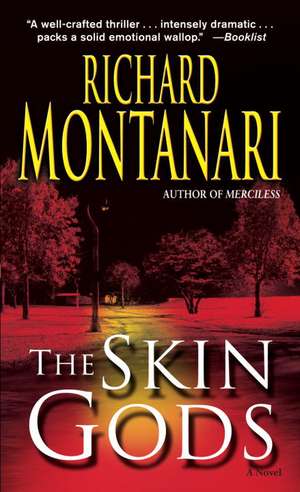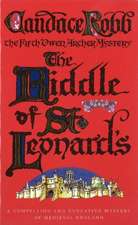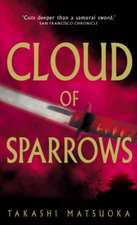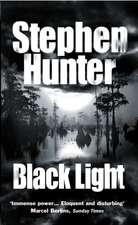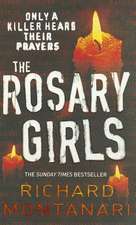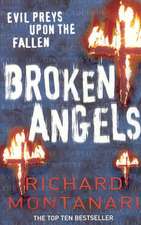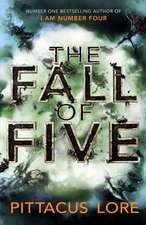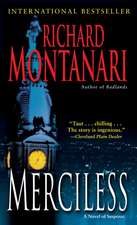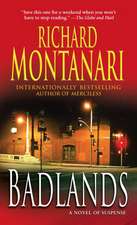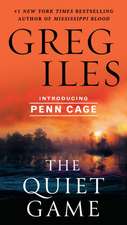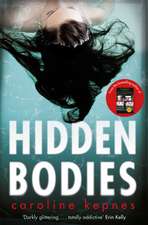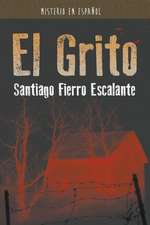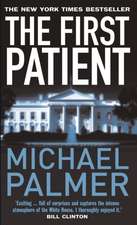The Skin Gods: A Novel
Autor Richard Montanarien Limba Engleză Paperback – 30 iul 2007
It is the steaming heart of summer in the City of Brotherly Love. Back on the force after taking a bullet during the arrest of a sadistic murderer, Detective Kevin Byrne warily returns to police headquarters. He cannot shake the memory of the Rosary Killer’s innocent victims–or his growing sense that the evil has not been vanquished. And when he and his partner, Detective Jessica Balzano, are called in on a bizarre case, Byrne’s gravest suspicions are confirmed.
A madman, dubbed The Actor by the homicide unit, is meticulously re-creating Hollywood’s most famous–and most gruesome–death scenes. The first murder is caught on film, spliced into a rented VHS edition of the Hitchcock black-and-white masterpiece Psycho. But in place of Janet Leigh is a real-life woman, and this time, the blood is red and the knife is real. Soon, more thrilling classics are turned into terrifying snuff films and placed on video store shelves for an unsuspecting public to find.
The key to this horrific puzzle could lie with any of The Skin Gods’ supporting cast: the A-list Hollywood director, the ruthless executive assistant, the convicted mass murderer–or perhaps someone else who has made a sinister art of gruesome violence.
Hot on the psychopath’s trail, Balzano and Byrne descend into the mouth of madness and beyond, deep into the depraved underworld of S&M clubs and the porn industry, where the worship of flesh leads to malevolent evil. Before the final credits roll, the investigators will discover that none of The Actor’s victims are as innocent as they appear to be, and that the clue the police need to prevent future murders might be found in Detective Byrne’s own dark past.
From the Hardcover edition.
| Toate formatele și edițiile | Preț | Express |
|---|---|---|
| Paperback (2) | 49.71 lei 3-5 săpt. | |
| BALLANTINE BOOKS – 30 iul 2007 | 49.71 lei 3-5 săpt. | |
| CORNERSTONE – 15 feb 2007 | 112.95 lei 3-5 săpt. | +11.24 lei 7-13 zile |
Preț: 49.71 lei
Nou
Puncte Express: 75
Preț estimativ în valută:
9.52€ • 9.93$ • 7.98£
9.52€ • 9.93$ • 7.98£
Carte disponibilă
Livrare economică 19 februarie-05 martie
Preluare comenzi: 021 569.72.76
Specificații
ISBN-13: 9780345470980
ISBN-10: 0345470982
Pagini: 402
Dimensiuni: 109 x 173 x 28 mm
Greutate: 0.2 kg
Editura: BALLANTINE BOOKS
Colecția Ballantine Books
ISBN-10: 0345470982
Pagini: 402
Dimensiuni: 109 x 173 x 28 mm
Greutate: 0.2 kg
Editura: BALLANTINE BOOKS
Colecția Ballantine Books
Notă biografică
Richard Montanari is a novelist, screenwriter, and essayist. His work has appeared in the Chicago Tribune, Detroit Free Press, Cleveland Plain Dealer, and scores of other national and regional publications. He is the OLMA-winning author of the internationally acclaimed thrillers The Rosary Girls, Kiss of Evil, Deviant Way, and The Violet Hour. Visit the author’s website at www.richardmontanari.com.
From the Hardcover edition.
From the Hardcover edition.
Extras
1
MONDAY, 3:05 AM
There is an hour known intimately to all who rouse to meet it, a time when darkness sheds fully the cloak of twilight and the streets fall still and silent, a time when shadows convene, become one, dissolve. A time when those who suffer disbelieve the dawn.
Every city has its quarter, its neon Golgotha.
In Philadelphia, it is known as South Street.
This night, while most of the City of Brotherly Love slept, while the rivers flowed mutely to the sea, the flesh peddler rushed down South Street like a dry, blistering wind. Between Third and Fourth Streets he pushed through a wrought-iron gate, walked down a narrow alleyway, and entered a private club called Paradise. The handful of patrons scattered about the room met his gaze, then immediately averted their eyes. In the peddler's stare they saw a portal to their own blackened souls, and knew that if they engaged him, even for a moment, the understanding would be far too much to bear.
To those who knew his trade, the peddler was an enigma, but not a puzzle anyone was eager to solve.
He was a big man, well over six feet tall, with a broad carriage and large, coarse hands that promised reckoning to those who crossed him. He had wheat-colored hair and cold green eyes, eyes that would spark to bright cobalt in candlelight, eyes that could take in the horizon with one glance, missing nothing. Above his right eye was a shiny keloid scar, a ridge of ropy tissue in the shape of an inverted V. He wore a long black leather coat that strained against the thick muscles in his back.
He had come to the club five nights in a row now, and this night he would meet his buyer. Appointments were not easily made at Paradise. Friendships were unknown.
The peddler sat at the back of the dank basement room at a table that, although not reserved for him, had become his by default. Even though Paradise was settled with players of every dark stripe and pedigree, it was clear that the peddler was of another breed.
The speakers behind the bar offered Mingus, Miles, Monk; the ceiling: soiled Chinese lanterns and rotary fans covered in wood-grain contact paper. Cones of blueberry incense burned, wedding the cigarette smoke, graying the air with a raw, fruity sweetness.
At three ten, two men entered the club. One was the buyer; the other, his guardian. They both met the eyes of the peddler. And knew.
The buyer, whose name was Gideon Pratt, was a squat, balding man in his late fifties, with flushed cheeks, restless gray eyes, and jowls that hung like melted wax. He wore an ill-fitting three-piece suit and had fingers long-gnarled by arthritis. His breath was fetid. His teeth, ocher and spare.
Behind him walked a bigger man--bigger even than the peddler. He wore mirrored sunglasses and a denim duster. His face and neck were ornamented with an elaborate web of ta moko, the Maori tribal tattoos.
Without a word, the three men gathered, then walked down a short hallway to a supply room.
The back room at Paradise was cramped and hot, packed with boxes of off-brand liquor, a pair of scarred metal desks, and a mildewed, ragged sofa. An old jukebox flickered carbon-blue light.
Once in the room, door closed, the large man, who went by the street name of Diablo, roughly patted down the peddler for weapons and wires, attempting to establish a stratum of power. As he was doing this, the peddler noted the three-word tattoo at the base of Diablo's neck. It read: mongrel for life. He also noticed the butt of a chrome Smith & Wesson revolver in the large man's waistband.
Satisfied that the peddler was unarmed and wore no listening devices, Diablo stepped away, behind Pratt, crossed his arms, and observed.
"What do you have for me?" Pratt asked.
The peddler considered the man before answering him. They had reached the moment that occurs in every transaction, the instant when the purveyor must come clean and lay his wares upon the velvet. The peddler reached slowly into his leather coat--there would be no furtive moves here--and removed a pair of Polaroid pictures. He handed them to Gideon Pratt.
Both photographs were of fully clothed, suggestively posed teenaged black girls. The one called Tanya sat on the front stoop of her row house, blowing a kiss to the photographer. Alicia, her sister, vamped on the beach in Wildwood.
As Pratt scrutinized the photos, his cheeks flared crimson for a moment, his breath hitched in his chest. "Just . . . beautiful," he said.
Diablo glanced at the snapshots, registering no reaction. He turned his gaze back to the peddler.
"What is her name?" Pratt asked, holding up one of the photos.
"Tanya," the peddler replied.
"Tan-ya," Pratt repeated, separating the syllables, as if to sort the essence of the girl. He handed one of the pictures back, then glanced at the photograph in his hand. "She is adorable," he added. "A mischievous one. I can tell."
Pratt touched the photograph, running his finger gently over the glossy surface. He seemed to drift for a moment, lost in some reverie, then put the picture into his pocket. He snapped back to the moment, back to the business at hand. "When?"
"Now," the peddler replied.
Pratt reacted with surprise and delight. He had not expected this. "She is here?"
The peddler nodded.
"Where?" asked Pratt.
"Nearby."
Gideon Pratt straightened his tie, adjusted the vest over his bulging stomach, smoothed what little hair he had. He took a deep breath, finding his axis, then gestured to the door. "Shall we?"
The peddler nodded again, then looked to Diablo for permission. Diablo waited a moment, further cementing his status, then stepped to the side.
The three men exited the club, walked across South Street to Orianna Street. They continued down Orianna, emerging into a small parking lot between the buildings. In the lot were two vehicles: a rusted van with smoked-glass windows and a late-model Chrysler. Diablo put a hand up, strode forward, and looked into the windows of the Chrysler. He turned, nodded, and Pratt and the peddler stepped up to the van.
"You have the payment?" the peddler asked.
Gideon Pratt tapped his pocket.
The peddler looked briefly between the two men, then reached into the pocket of his coat and retrieved a set of keys. Before he could insert the key into the van's passenger door, he dropped them to the ground.
Both Pratt and Diablo instinctively looked down, momentarily distracted.
In the following, carefully considered instant, the peddler bent down to retrieve the keys. Instead of picking them up, he closed his hand around the crowbar he had placed behind the right front tire earlier in the evening. When he arose, he spun on his heels and slammed the steel bar into the center of Diablo's face, exploding the man's nose into a thick scarlet vapor of blood and ruined cartilage. It was a surgically delivered blow, perfectly leveraged, one designed to cripple and incapacitate but not kill. With his left hand the peddler removed the Smith & Wesson revolver from Diablo's waistband.
Dazed, momentarily bewildered, operating on animal instinct instead of reason, Diablo charged the peddler, his field of vision now clouded with blood and involuntary tears. His forward motion was met with the butt of the Smith & Wesson, swung with the full force of the peddler's considerable strength. The blow sent six of Diablo's teeth into the cool night air, then clacking to the ground like so many spilled pearls.
Diablo folded to the pitted asphalt, howling in agony.
A warrior, he rolled onto his knees, hesitated, then looked up, anticipating the deathblow.
"Run," the peddler said.
Diablo paused for a moment, his breath now coming in staggered, sodden gasps. He spit a mouthful of blood and mucus. When the peddler cocked the hammer of the weapon and placed the tip of the barrel to his forehead, Diablo saw the wisdom of obeying the man's order.
With great effort, he arose, staggered down the road toward South Street, and disappeared, never once taking his eyes from the peddler.
The peddler then turned to Gideon Pratt.
Pratt tried to strike a pose of menace, but this was not his gift. He was facing a moment all murderers fear, a brutal computation of his crimes against man, against God.
"Wh-who are you?" Pratt asked.
The peddler opened the back door of the van. He calmly deposited the gun and the crowbar, and removed a thick, cowhide belt. He wrapped his knuckles in the hard leather.
"Do you dream?" the peddler asked.
"What?"
"Do . . . you . . . dream?"
Gideon Pratt fell speechless.
For Detective Kevin Francis Byrne of the Philadelphia Police Department's Homicide Unit, the answer was a moot point. He had tracked Gideon Pratt for a long time, and had lured him into this moment with precision and care, a scenario that had invaded his dreams.
Gideon Pratt had raped and murdered a fifteen-year-old girl named Deirdre Pettigrew in Harrowgate Park, and the department had all but given up on solving the case. It was the first time Pratt had killed one of his victims, and Byrne had known that it would not be easy to draw him out. Byrne had invested a few hundred hours of his own time and many a night's sleep in anticipation of this very second.
And now, as dawn remained a dim rumor in the City of Brotherly Love, as Kevin Byrne stepped forward and landed the first blow, came his receipt.
Twenty minutes later they were in a curtained emergency room at Jefferson Hospital. Gideon Pratt stood dead center, Byrne to one side, a staff intern named Avram Hirsch on the other.
Pratt had a knot on his forehead the size and shape of a rotted plum, a bloodied lip, a deep purple bruise on his right cheek, and what might have been a broken nose. His right eye was nearly swollen shut. The front of his formerly white shirt was a deep brown, caked with blood.
As Byrne looked at the man--humiliated, demeaned, disgraced, caught--he thought about his own partner in the Homicide Unit, a daunting piece of ironwork named Jimmy Purify. Jimmy would have loved this, Byrne thought. Jimmy loved the characters, of which Philly seemed to have an endless supply. The street professors, the junkie prophets, the hookers with hearts of marble.
But most of all, Detective Jimmy Purify loved catching the bad guys. The worse the man, the more Jimmy savored the hunt.
There was no one worse than Gideon Pratt.
They had tracked Pratt through an extensive labyrinth of informants, had followed him through the darkest veins of Philadelphia's netherworld of sex clubs and child pornography rings. They had pursued him with the same sense of purpose, the same focus and rabid intent with which they had stepped out of the academy so many years earlier.
Which was just the way Jimmy Purify liked it.
It made him feel like a kid again, he said.
In his day Jimmy had been shot twice, run over once, beaten far too many times to calculate, but it was a triple bypass that finally took him out. While Kevin Byrne was so pleasantly engaged with Gideon Pratt, James "Clutch" Purify was resting in a post-op room in Mercy Hospital, tubes and drip lines snaking out of his body like Medusa's snakes.
The good news was that Jimmy's prognosis looked good. The sad news was that Jimmy thought he was coming back to the job. He wasn't. No one ever did from a triple. Not at fifty. Not in Homicide. Not in Philly.
I miss you, Clutch, Byrne thought, knowing that he was going to meet his new partner later that day. It just ain't the same without you, man.
It never will be.
Byrne had been there when Jimmy went down, not ten, powerless feet away. They had been standing near the register at Malik's, a hole-in-the-bricks hoagie shop at Tenth and Washington. Byrne had been loading their coffees with sugar while Jimmy had been macking the waitress, Desiree, a young, cinnamon-skinned beauty at least three musical styles Jimmy's junior and five miles out of his league. Desiree was the only real reason they ever stopped at Malik's. It sure as hell wasn't the food.
One minute Jimmy had been leaning against the counter, his young-girl rap firing on all eight, his smile on high beam. The next minute he was on the floor, his face contorted in pain, his body rigid, the fingers of his huge hands curling into claws.
Byrne had frozen that instant in his mind, the way he had stilled few others in his life. Over his twenty years on the force, he had found it almost routine to accept the moments of blind heroism and reckless courage in the people he loved and admired. He had even come to accept the senseless, random acts of savagery delivered by and unto strangers. These things came with the job: the steep premium to justice sought. It was the moments of naked humanity and weakness of flesh, however, he could not elude, the images of body and spirit betrayed that burrowed beneath the surface of his heart.
When he saw the big man on the muddied tile of the diner, his body skirmishing with death, the silent scream slashed into his jaw, he knew that he would never look at Jimmy Purify the same way again. Oh, he would love him, as he had come to over the years, and he would listen to his preposterous stories, and he would, by the grace of God, once again marvel at Jimmy's lithe and fluid abilities behind a gas grill on those sweltering Philly summer Sundays, and he would, without a moment's thought or hesitation, take a bullet to the heart for the man, but he knew immediately that this thing they did--the unflinching descent into the maw of violence and insanity, night after night--was over.
As much as it brought Byrne shame and regret, that was the reality of that long, terrible night.
The reality of this night, however, found a dark balance in Byrne's mind, a delicate symmetry that he knew would bring Jimmy Purify peace. Deirdre Pettigrew was dead, and Gideon Pratt was going to take the full ride. Another family was shredded by grief, but this time the killer had left behind his DNA in the form of a gray pubic hair that would send him to the little tiled room at SCI Greene. There Gideon Pratt would meet the icy needle if Byrne had anything to say about it.
Of course, the justice system being what it was, there was a fifty-fifty chance that, if convicted, Pratt would get life without parole.
MONDAY, 3:05 AM
There is an hour known intimately to all who rouse to meet it, a time when darkness sheds fully the cloak of twilight and the streets fall still and silent, a time when shadows convene, become one, dissolve. A time when those who suffer disbelieve the dawn.
Every city has its quarter, its neon Golgotha.
In Philadelphia, it is known as South Street.
This night, while most of the City of Brotherly Love slept, while the rivers flowed mutely to the sea, the flesh peddler rushed down South Street like a dry, blistering wind. Between Third and Fourth Streets he pushed through a wrought-iron gate, walked down a narrow alleyway, and entered a private club called Paradise. The handful of patrons scattered about the room met his gaze, then immediately averted their eyes. In the peddler's stare they saw a portal to their own blackened souls, and knew that if they engaged him, even for a moment, the understanding would be far too much to bear.
To those who knew his trade, the peddler was an enigma, but not a puzzle anyone was eager to solve.
He was a big man, well over six feet tall, with a broad carriage and large, coarse hands that promised reckoning to those who crossed him. He had wheat-colored hair and cold green eyes, eyes that would spark to bright cobalt in candlelight, eyes that could take in the horizon with one glance, missing nothing. Above his right eye was a shiny keloid scar, a ridge of ropy tissue in the shape of an inverted V. He wore a long black leather coat that strained against the thick muscles in his back.
He had come to the club five nights in a row now, and this night he would meet his buyer. Appointments were not easily made at Paradise. Friendships were unknown.
The peddler sat at the back of the dank basement room at a table that, although not reserved for him, had become his by default. Even though Paradise was settled with players of every dark stripe and pedigree, it was clear that the peddler was of another breed.
The speakers behind the bar offered Mingus, Miles, Monk; the ceiling: soiled Chinese lanterns and rotary fans covered in wood-grain contact paper. Cones of blueberry incense burned, wedding the cigarette smoke, graying the air with a raw, fruity sweetness.
At three ten, two men entered the club. One was the buyer; the other, his guardian. They both met the eyes of the peddler. And knew.
The buyer, whose name was Gideon Pratt, was a squat, balding man in his late fifties, with flushed cheeks, restless gray eyes, and jowls that hung like melted wax. He wore an ill-fitting three-piece suit and had fingers long-gnarled by arthritis. His breath was fetid. His teeth, ocher and spare.
Behind him walked a bigger man--bigger even than the peddler. He wore mirrored sunglasses and a denim duster. His face and neck were ornamented with an elaborate web of ta moko, the Maori tribal tattoos.
Without a word, the three men gathered, then walked down a short hallway to a supply room.
The back room at Paradise was cramped and hot, packed with boxes of off-brand liquor, a pair of scarred metal desks, and a mildewed, ragged sofa. An old jukebox flickered carbon-blue light.
Once in the room, door closed, the large man, who went by the street name of Diablo, roughly patted down the peddler for weapons and wires, attempting to establish a stratum of power. As he was doing this, the peddler noted the three-word tattoo at the base of Diablo's neck. It read: mongrel for life. He also noticed the butt of a chrome Smith & Wesson revolver in the large man's waistband.
Satisfied that the peddler was unarmed and wore no listening devices, Diablo stepped away, behind Pratt, crossed his arms, and observed.
"What do you have for me?" Pratt asked.
The peddler considered the man before answering him. They had reached the moment that occurs in every transaction, the instant when the purveyor must come clean and lay his wares upon the velvet. The peddler reached slowly into his leather coat--there would be no furtive moves here--and removed a pair of Polaroid pictures. He handed them to Gideon Pratt.
Both photographs were of fully clothed, suggestively posed teenaged black girls. The one called Tanya sat on the front stoop of her row house, blowing a kiss to the photographer. Alicia, her sister, vamped on the beach in Wildwood.
As Pratt scrutinized the photos, his cheeks flared crimson for a moment, his breath hitched in his chest. "Just . . . beautiful," he said.
Diablo glanced at the snapshots, registering no reaction. He turned his gaze back to the peddler.
"What is her name?" Pratt asked, holding up one of the photos.
"Tanya," the peddler replied.
"Tan-ya," Pratt repeated, separating the syllables, as if to sort the essence of the girl. He handed one of the pictures back, then glanced at the photograph in his hand. "She is adorable," he added. "A mischievous one. I can tell."
Pratt touched the photograph, running his finger gently over the glossy surface. He seemed to drift for a moment, lost in some reverie, then put the picture into his pocket. He snapped back to the moment, back to the business at hand. "When?"
"Now," the peddler replied.
Pratt reacted with surprise and delight. He had not expected this. "She is here?"
The peddler nodded.
"Where?" asked Pratt.
"Nearby."
Gideon Pratt straightened his tie, adjusted the vest over his bulging stomach, smoothed what little hair he had. He took a deep breath, finding his axis, then gestured to the door. "Shall we?"
The peddler nodded again, then looked to Diablo for permission. Diablo waited a moment, further cementing his status, then stepped to the side.
The three men exited the club, walked across South Street to Orianna Street. They continued down Orianna, emerging into a small parking lot between the buildings. In the lot were two vehicles: a rusted van with smoked-glass windows and a late-model Chrysler. Diablo put a hand up, strode forward, and looked into the windows of the Chrysler. He turned, nodded, and Pratt and the peddler stepped up to the van.
"You have the payment?" the peddler asked.
Gideon Pratt tapped his pocket.
The peddler looked briefly between the two men, then reached into the pocket of his coat and retrieved a set of keys. Before he could insert the key into the van's passenger door, he dropped them to the ground.
Both Pratt and Diablo instinctively looked down, momentarily distracted.
In the following, carefully considered instant, the peddler bent down to retrieve the keys. Instead of picking them up, he closed his hand around the crowbar he had placed behind the right front tire earlier in the evening. When he arose, he spun on his heels and slammed the steel bar into the center of Diablo's face, exploding the man's nose into a thick scarlet vapor of blood and ruined cartilage. It was a surgically delivered blow, perfectly leveraged, one designed to cripple and incapacitate but not kill. With his left hand the peddler removed the Smith & Wesson revolver from Diablo's waistband.
Dazed, momentarily bewildered, operating on animal instinct instead of reason, Diablo charged the peddler, his field of vision now clouded with blood and involuntary tears. His forward motion was met with the butt of the Smith & Wesson, swung with the full force of the peddler's considerable strength. The blow sent six of Diablo's teeth into the cool night air, then clacking to the ground like so many spilled pearls.
Diablo folded to the pitted asphalt, howling in agony.
A warrior, he rolled onto his knees, hesitated, then looked up, anticipating the deathblow.
"Run," the peddler said.
Diablo paused for a moment, his breath now coming in staggered, sodden gasps. He spit a mouthful of blood and mucus. When the peddler cocked the hammer of the weapon and placed the tip of the barrel to his forehead, Diablo saw the wisdom of obeying the man's order.
With great effort, he arose, staggered down the road toward South Street, and disappeared, never once taking his eyes from the peddler.
The peddler then turned to Gideon Pratt.
Pratt tried to strike a pose of menace, but this was not his gift. He was facing a moment all murderers fear, a brutal computation of his crimes against man, against God.
"Wh-who are you?" Pratt asked.
The peddler opened the back door of the van. He calmly deposited the gun and the crowbar, and removed a thick, cowhide belt. He wrapped his knuckles in the hard leather.
"Do you dream?" the peddler asked.
"What?"
"Do . . . you . . . dream?"
Gideon Pratt fell speechless.
For Detective Kevin Francis Byrne of the Philadelphia Police Department's Homicide Unit, the answer was a moot point. He had tracked Gideon Pratt for a long time, and had lured him into this moment with precision and care, a scenario that had invaded his dreams.
Gideon Pratt had raped and murdered a fifteen-year-old girl named Deirdre Pettigrew in Harrowgate Park, and the department had all but given up on solving the case. It was the first time Pratt had killed one of his victims, and Byrne had known that it would not be easy to draw him out. Byrne had invested a few hundred hours of his own time and many a night's sleep in anticipation of this very second.
And now, as dawn remained a dim rumor in the City of Brotherly Love, as Kevin Byrne stepped forward and landed the first blow, came his receipt.
Twenty minutes later they were in a curtained emergency room at Jefferson Hospital. Gideon Pratt stood dead center, Byrne to one side, a staff intern named Avram Hirsch on the other.
Pratt had a knot on his forehead the size and shape of a rotted plum, a bloodied lip, a deep purple bruise on his right cheek, and what might have been a broken nose. His right eye was nearly swollen shut. The front of his formerly white shirt was a deep brown, caked with blood.
As Byrne looked at the man--humiliated, demeaned, disgraced, caught--he thought about his own partner in the Homicide Unit, a daunting piece of ironwork named Jimmy Purify. Jimmy would have loved this, Byrne thought. Jimmy loved the characters, of which Philly seemed to have an endless supply. The street professors, the junkie prophets, the hookers with hearts of marble.
But most of all, Detective Jimmy Purify loved catching the bad guys. The worse the man, the more Jimmy savored the hunt.
There was no one worse than Gideon Pratt.
They had tracked Pratt through an extensive labyrinth of informants, had followed him through the darkest veins of Philadelphia's netherworld of sex clubs and child pornography rings. They had pursued him with the same sense of purpose, the same focus and rabid intent with which they had stepped out of the academy so many years earlier.
Which was just the way Jimmy Purify liked it.
It made him feel like a kid again, he said.
In his day Jimmy had been shot twice, run over once, beaten far too many times to calculate, but it was a triple bypass that finally took him out. While Kevin Byrne was so pleasantly engaged with Gideon Pratt, James "Clutch" Purify was resting in a post-op room in Mercy Hospital, tubes and drip lines snaking out of his body like Medusa's snakes.
The good news was that Jimmy's prognosis looked good. The sad news was that Jimmy thought he was coming back to the job. He wasn't. No one ever did from a triple. Not at fifty. Not in Homicide. Not in Philly.
I miss you, Clutch, Byrne thought, knowing that he was going to meet his new partner later that day. It just ain't the same without you, man.
It never will be.
Byrne had been there when Jimmy went down, not ten, powerless feet away. They had been standing near the register at Malik's, a hole-in-the-bricks hoagie shop at Tenth and Washington. Byrne had been loading their coffees with sugar while Jimmy had been macking the waitress, Desiree, a young, cinnamon-skinned beauty at least three musical styles Jimmy's junior and five miles out of his league. Desiree was the only real reason they ever stopped at Malik's. It sure as hell wasn't the food.
One minute Jimmy had been leaning against the counter, his young-girl rap firing on all eight, his smile on high beam. The next minute he was on the floor, his face contorted in pain, his body rigid, the fingers of his huge hands curling into claws.
Byrne had frozen that instant in his mind, the way he had stilled few others in his life. Over his twenty years on the force, he had found it almost routine to accept the moments of blind heroism and reckless courage in the people he loved and admired. He had even come to accept the senseless, random acts of savagery delivered by and unto strangers. These things came with the job: the steep premium to justice sought. It was the moments of naked humanity and weakness of flesh, however, he could not elude, the images of body and spirit betrayed that burrowed beneath the surface of his heart.
When he saw the big man on the muddied tile of the diner, his body skirmishing with death, the silent scream slashed into his jaw, he knew that he would never look at Jimmy Purify the same way again. Oh, he would love him, as he had come to over the years, and he would listen to his preposterous stories, and he would, by the grace of God, once again marvel at Jimmy's lithe and fluid abilities behind a gas grill on those sweltering Philly summer Sundays, and he would, without a moment's thought or hesitation, take a bullet to the heart for the man, but he knew immediately that this thing they did--the unflinching descent into the maw of violence and insanity, night after night--was over.
As much as it brought Byrne shame and regret, that was the reality of that long, terrible night.
The reality of this night, however, found a dark balance in Byrne's mind, a delicate symmetry that he knew would bring Jimmy Purify peace. Deirdre Pettigrew was dead, and Gideon Pratt was going to take the full ride. Another family was shredded by grief, but this time the killer had left behind his DNA in the form of a gray pubic hair that would send him to the little tiled room at SCI Greene. There Gideon Pratt would meet the icy needle if Byrne had anything to say about it.
Of course, the justice system being what it was, there was a fifty-fifty chance that, if convicted, Pratt would get life without parole.
Recenzii
Praise for Richard Montanari’s The Rosary Girls
“Readers of this terrifying page-turner are in the hands of a master storyteller. Be prepared to stay up all night.”
–James Ellroy
“Thoroughly creepy . . . [an] effective blend of the angelic and the demonic . . . Montanari gets it right.”
–The Philadelphia Inquirer
“A relentlessly suspenseful, soul-chilling thriller that hooks you instantly.”
–Tess Gerritsen
“Gripping . . . You begin The Rosary Girls out of curiosity but finish it out of compulsion.”
–Cleveland Plain Dealer
“Nonstop action and nail-biting suspense . . . a page-turning heart-stopping winner.”
–Kingston Observer
“A no-holds-barred thriller . . . Those with a taste for Thomas Harris will look forward to the sure-to-follow sequel.”
–Library Journal
From the Hardcover edition.
“Readers of this terrifying page-turner are in the hands of a master storyteller. Be prepared to stay up all night.”
–James Ellroy
“Thoroughly creepy . . . [an] effective blend of the angelic and the demonic . . . Montanari gets it right.”
–The Philadelphia Inquirer
“A relentlessly suspenseful, soul-chilling thriller that hooks you instantly.”
–Tess Gerritsen
“Gripping . . . You begin The Rosary Girls out of curiosity but finish it out of compulsion.”
–Cleveland Plain Dealer
“Nonstop action and nail-biting suspense . . . a page-turning heart-stopping winner.”
–Kingston Observer
“A no-holds-barred thriller . . . Those with a taste for Thomas Harris will look forward to the sure-to-follow sequel.”
–Library Journal
From the Hardcover edition.
Descriere
In this electrifying sequel to "The Rosary Girls," Philadelphia detectives Jessica Balzano and Kevin Byrne are on the trail of a maniacal killer, who is recreating Hollywoods most famous murder scenes and casting real-life victims.
